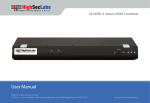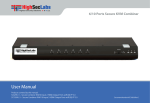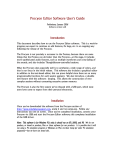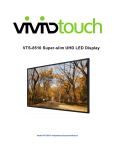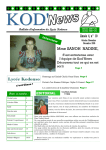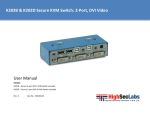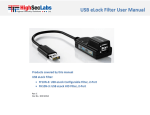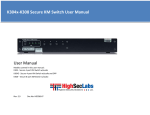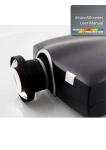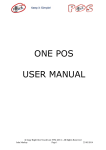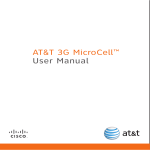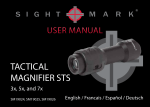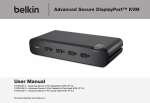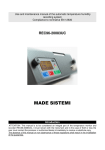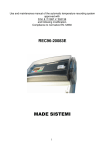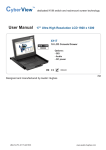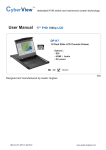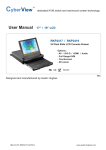Download 2/4- Ports Secure KVM Combiner
Transcript
Section 1 - Introduction 2/4 Ports Secure KVM Combiner User Manual Products covered by this manual: 2/4- Ports Secure KVM Combiner SC21H-3 – HSL Secure SH KVM Combiner 2-Port HDMI video, PP 3.0 SC42DU-3– HSL Secure SH Combiner KVM 4-Port 2x DVI video, w/fUSB, PP 3.0 SC42PU-3 – HSL Secure SH Combiner KVM 4-Port DP in 2x DP video Out, w/fUSB, PP 3.0 SC42HU-3 – HSL Secure SH Combiner KVM 4-Port 2x HDMI video, w/fUSB, PP 3.0 Rev: E Doc No.: HDC10355 1 2/4 Ports Secure KVM Combiner User Manual Section 4 - Operation Table of Contents Introduction ....................................................................................... 3 Intended Audience ............................................................................. 3 What is a KVM Combiner? ............................................................. 3 Package Contents .......................................................................... 3 Revision.......................................................................................... 3 Operation ......................................................................................... 24 System Setup ............................................................................... 24 Dual display installation ............................................................... 26 Operation ..................................................................................... 27 Troubleshooting Guide .................................................................... 39 COPYRIGHT AND LEGAL NOTICE .................................................. 43 Safety Precautions ......................................................................... 4 Safety Precautions (French)........................................................... 5 User Guidance & Precautions ........................................................ 6 Main Features ................................................................................ 8 Tamper Evident Labels .................................................................. 9 Active Anti-Tampering System .................................................... 10 ..................................................................................................... 10 Product Enclosure Warning Label ............................................... 10 Equipment Requirements............................................................ 10 Front Panel Features: .................................................................. 13 Rear Panel Features – SK42HU-3 ................................................. 14 ..................................................................................................... 14 Rear Panel Features – SK42PU-3 ................................................. 15 Rear Panel Features – SK21PU-3 ................................................. 16 Rear Panel Features – SK42DU-3 ................................................. 17 Product Specifications ................................................................. 18 Before Installation ....................................................................... 19 Installation ....................................................................................... 21 Typical system installation........................................................... 23 2 2/4 Ports Secure KVM Combiner User Manual Section 4 - Operation Introduction and video ports. The product was designed and certified National Security agencies. Package Contents Thank you for purchasing this High Sec Labs (HSL) Secure product designed for use in secure defense and intelligence installations. The product provides the highest security safeguards and features that meet today’s IA (information assurance) computing requirements as defined in the latest PSS Protection Profile Rev 3.0. Inside product packaging you will find the following: This User Manual provides all the details you’ll need to install and operate your new product. 5-button Mouse User Guidance Documentation Intended Audience HSL Secure KVM Product DC Power Supply for 2 port models, AC Power Cord for 4 port models Revision A – Initial Release, 24 Feb 2015 This document is intended for the following professionals: B – Corrections, 3 April 2015 • System Administrators/IT Managers C – Rev change, 12 May 2015 • End Users D – User Guidance updates, 21 June 2015 What is a KVM Combiner? There are many cases where one computer user needs to work simultaneously with few computers. The Secure KVM Combiner designed to provide users with native windowing environment across isolated networks. Connected computers may operate at different isolated networks having different security levels without exposing the organization to the risks of information leakage through the KVM. The HSL Secure KVM Combiner switch uses advanced video processing technology to draw a high resolution dynamic “mosaic” of images generated by different computer sources. Built-in video sources isolation forces unidirectional flow of data through the USB 3 E – Correction to Features section, 13 August 2015 Important Security Note: If you are aware of potential security vulnerability while installing or operating this product, we encourage you to contact us immediately in one of the following ways: Web form: http://www.highseclabs.com/support/case/ Email: [email protected] Tel: +972-4-9591191 or +972-4-9591192 Important: This product is equipped with always-on active antitampering system. Any attempt to open the product enclosure will activate the anti-tamper triggers and render the unit inoperable and warranty void. 2/4 Ports Secure KVM Combiner User Manual Section 4 - Operation Safety Precautions Please read the following safety precautions carefully before using the product: • Before cleaning, disconnect the product from any electrical power supply. • Do not expose the product to excessive humidity or moisture. • Do not store or use for extensive period of time in extreme thermal conditions – it may shorten product lifetime. • Install the product only on a clean secure surface. • If the product is not used for a long period of time, disconnect it from electrical power. • If any of the following situations occurs, have the product checked by an HSL qualified service technician: o o o o o o 4 • The product should be stored and used only in temperature and humidity controlled environments as defined in the product’s environmental specifications. • Never attempt to open the product enclosure. Any attempt to open the enclosure will permanently damage the product. • The product contains a non-replaceable internal battery. Never attempt to replace the battery or open the enclosure. • This product is equipped with always-on active anti-tampering system. Any attempt to open the product enclosure will activate the anti-tamper triggers and render the unit inoperable and warranty void. Liquid penetrates the product’s case. The product is exposed to excessive moisture, water or any other liquid. The product is not working well even after carefully following the instructions in this user’s manual. The product has been dropped or is physically damaged. The product shows obvious signs of breakage or loose internal parts. In case of external power supply – If power supply overheats, is broken or damaged, or has a damaged cable. 2/4 Ports Secure KVM Combiner User Manual Section 4 - Operation Safety Precautions (French) Veuillez lire attentivement les précautions de sécurité suivantes avant d’utiliser le produit: ou provoque des court circuits de la prise du secteur. o Un liquide a pénétré dans le boîtier de l’appareil. o L’appareil est exposé à de l’humidité excessive ou à l’eau. o L’appareil ne fonctionne pas correctement même après avoir suivi attentivement les instructions contenues dans ce guide de l’utilisateur. Avant nettoyage, débranchez l’appareil de l’alimentation DC / AC. Assurez-vous de ne pas exposer l’appareil à une humidité excessive. Assurez-vous d’installer l’appareil sur une surface sécurisée propre. Ne placez pas le cordon d’alimentation DC en travers d’un passage. o Si l’appareil n’est pas utilisé de longtemps, retirez l’alimentation murale de la prise électrique. L’appareil est tombé ou est physiquement endommagé. o L’appareil présente des signes évidents de pièce interne cassée ou desserrée o L’appareil contient une batterie interne. La batterie n’est pas remplaçable. N’essayez jamais de remplacer la batterie car toute tentative d’ouvrir le boîtier de l’appareil entraînerait des dommages permanents à l’appareil. o Ce produit est équipé d'toujours-sur le système anti-sabotage active. Toute tentative d'ouvrir le boîtier du produit va activer le déclencheur anti-sabotage et de rendre l'unité vide inutilisable et garantie. L’appareil devra être rangé uniquement dans des environnements à humidité et température contrôlées comme défini dans les caractéristiques environnementales du produit. L’alimentation murale utilisée avec cet appareil devra être du modèle fourni par le fabricant ou un équivalent certifié fourni par le fabricant ou fournisseur de service autorisé. Si une des situations suivantes survenait, faites vérifier l’appareil par un technicien de maintenance qualifié: o 5 o En cas d'alimentation externe - L’alimentation de l’appareil surchauffe, est endommagée, cassée ou dégage de la fumée 2/4 Ports Secure KVM Combiner User Manual Section 4 - Operation User Guidance & Precautions Please read the following User Guidance & Precautions carefully before using the product: 1. As product powers-up it performs a self-test procedure. In case of self- test failure for any reason, including jammed buttons, the product will be Inoperable. Self-test failure will be indicated by the following abnormal LED behavior: a. All channel-select LEDs will be turned ON and then OFF; b. A specific, predefined LED combination will be turned ON; c. The predefined LED combination will indicate the problem type (jammed buttons, firmware integrity). Try to power cycle product. If problem persists please contact your system administrator or technical support. 2. Product power-up and RFD behavior: a. By default, after product power-up, the active channel will be computer #1, indicated by the applicable front panel push button LED lit. b. Product Restore-to-Factory-Default (RFD) function is available via a physical control button on rear panel. Use a sharp object or paper clip to hold RFD button pressed for several seconds to initiate an RFD action. c. RFD action will be indicated by front panel LEDs blinking all together. d. When product boots after RFD, keyboard and mouse will be mapped to the active channel #1 and default settings will be restored, erasing all user-set definitions. 6 3. The appropriate usage of peripherals (e.g. keyboard, mouse, display, authentication device) is described in detail in this User Manual's appropriate sections. Do not connect any authentication device with an external power source to product. 4. For security reasons products do not support wireless keyboards and mice. In any case do not connect wireless keyboard/mouse to product. 5. For security reasons products do not support microphone/line-in audio input. In any case do not connect a microphone to product audio output port, including headsets. 6. Product is equipped with always-on active anti-tampering system. Any attempt to open product enclosure will activate the anti-tamper system indicated by all channel-select LEDs flashing continuously. In this case, product will be inoperable and warranty void. If product enclosure appears disrupted or if all channel-select LEDs flash continuously, please remove product from service immediately and contact technical support. 7. In case a connected device is rejected in the console port group the user will have the following visual indications: a. When connecting a non-qualified keyboard, the keyboard will be non-functional with no visible keyboard strokes on screen when using the keyboard. 2/4 Ports Secure KVM Combiner User Manual Section 4 - Operation b. When connecting a non-qualified mouse, the mouse will be non-functional with mouse cursor frozen on screen. c. When connecting a non-qualified display, the video diagnostic LED will flash green and video will not work. d. When connecting a non-qualified USB device, fUSB LED will flash green and USB device will be inoperable. 8. Do not connect product to computing devices: a. That are TEMPEST computers; b. That include telecommunication equipment; c. That include frame grabber video cards; d. That include special audio processing cards. 9. Product has a remote control port in the back panel labeled RCU. Do not use this port - it is inoperable and for future use. 10. Important! Before re-allocating computers to channels, it is mandatory to power cycle product, keeping it powered OFF for more than 1 minute. 11. Product log access and administrator configuration options are described in product Administrator Guide. 12. Authentication session will be terminated once product power is down or user intentionally terminates session. 13. If you are aware of any potential security vulnerability while installing or operating product, please remove product from service immediately and contact us in one of the ways listed in this manual. 7 2/4 Ports Secure KVM Combiner User Manual Section 4 - Operation Main Features Product is designed, manufactured and delivered in securitycontrolled environments. Below is a summary of the main advanced features incorporated in product: Product incorporates secure administrator access and log functions to provide auditable trail for all product security events, including battery backup life for anti-tampering and log functions. Nonreprogrammable firmware prevents the ability to tamper with product logic. Always-on, active anti-tamper system Advanced isolation between computers and shared peripherals The emulations of keyboard, mouse and display EDID, prevent direct contact between computers and shared peripherals. Product design achieves maximal security by keeping the video path separate with keyboard and mouse switched together, purging keyboard buffer when switching channels. All these features contribute to strong isolation between computer interfaces, maintained even when product is powered off. Unidirectional data flow: USB, audio and video Unique hardware architecture components prevent unauthorized data flow, including: Optical unidirectional data flow diodes in the USB data path that filtrate and reject unqualified USB devices; Secure analog audio diodes that prevent audio eavesdropping with no support for microphone or any other audio-input device; Video path is kept separate from all other traffic, enforcing unidirectional native video flow. EDID emulation is done at power up and blocks all EDID/MCCS writes. For DisplayPort video, filtration of AUX channel exists to reject unauthorized transactions. Isolation of power domains Complete isolation of power domains prevents signaling attacks. Secure administrator access & log functions 8 Active anti-tampering system prevents malicious insertion of hardware implant such as wireless key-logger inside product enclosure. Any anti-tampering attempt causes isolation of all computers and peripheral devices rendering product inoperable and showing clear indications of tampering event to user. Holographic security tamper-evident labels are placed on the enclosure to provide a clear visual indication if product has been opened or compromised. Metal enclosure is designed to resist mechanical tampering with all microcontrollers protected against firmware-read, modification and rewrite. Main Features (Cont.) Video Support DVI models support DVI-I displays as well as VGA and HDMI via compatible cables. DP models support DisplayPort1.1 & 1.2 displays. HDMI models support HDMI displays. Dual Display and Resolutions Supported Products supports dual display and video resolutions of up to 4K-2K Ultra HD (3840 X 2160 pixels). 2/4 Ports Secure KVM Combiner User Manual Section 4 - Operation Real-time and real quality video Pixel-by-pixel video image. No quality loss, latency, reduced colors, dropped frames or artifacts. Fastest digital video processing technology available in any KVM today. Less than 30 millisecond latency. Easy customization System mode enables easy customization of channels, colors, cursors, task-bar, background etc. User programmable buttons enable quick setting of user defined screen arrangements. Audio Support The HSL Secure KVM Combiner supports audio out switching. Microphone switching is not supported to prevent analog leakages through audio ports. such as user authentication smart card reader data, and all other product traffic. The fUSB feature can be managed via Configurable Device Filtering (CDF) mechanism with configuration permissions limited to authenticated administrators. For more details please refer to the "fUSB Configuration Manual". "Freeze fUSB" feature Dedicated "Freeze fUSB" push button on front panel enables to lock this function to a specific channel. When locked, switching channels will not affect processes performed by the USB device connected to the locked channel. "Freeze Audio" feature Dedicated "Freeze Audio" push button on front panel enables to lock this function to a specific channel in a way that switching between channels leaves the audio function locked to current channel. Advanced Scaling Function The HSL Secure KVM Combiner has an advanced scaling function allowing the user to scale the video source 2x and 4x smaller to assure good view and superb work experience. User can now fit 4 full HD sources on a single HD screen by scaling each source and all in real time with no data loss. Tamper Evident Labels Scale and Tile Modes Allowing users to focus on a main source while viewing the other sources or tile all of the sources equally If for any reason one or more tamper-evident label is missing, appears disrupted, or looks different than the example shown here, please call Technical Support and avoid using that product. Product uses holographic tamper evident labels to provide visual indications in case of an enclosure intrusion attempt. When opening product packaging inspect the tampering evident labels. Filtered USB (fUSB) feature (applicable models) fUSB feature enables to connect authorized USB devices to product. Product is designed with complete isolation between fUSB data, 9 2/4 Ports Secure KVM Combiner User Manual Section 4 - Operation Active Anti-Tampering System Product is equipped with always-on active anti-tampering system. If mechanical intrusion is detected by this system, the Product will be permanently disabled and all LEDs will blink continuously. If product indicates "tampered state" (all LEDs blinking) - please call Technical Support and avoid using that product. Product Enclosure Warning Label Product has the following warning sticker placed in a prominent location on product enclosure: Equipment Requirements Cables It is highly recommended to use HSL Cable Kits for product to ensure optimal security and performance. One Cable Kit is required per connected computer. HSL Tamper Evident Label Operating Systems 10 2/4 Ports Secure KVM Combiner User Manual Section 4 - Operation Product is compatible with devices running on the following operating systems: The product console USB mouse port is compatible with standard USB mice. • Microsoft® Windows® Notes: • Red Hat®, Ubuntu® and other Linux® platforms • Mac OS® X v10.3 and higher. USB Keyboard console port The product console USB keyboard port is compatible with Standard USB keyboards. Notes: a. Console USB keyboard and mouse ports are switchable, i.e. you can connect keyboard to mouse port and vice versa. However, for optimal operation it is recommended to connect USB keyboard to console USB keyboard port and USB mouse to console USB mouse port. b. For security reasons products do not support wireless keyboards. In any case do not connect wireless keyboard to product. c. Non-standard keyboards, such as keyboards with integrated USB hubs and other USB-integrated devices, may not be fully supported due to security policy. If they are supported, only classical keyboard (HID) operation will be functional. It is recommended to use standard USB keyboards. USB Mouse console port 11 a. Console USB keyboard and mouse ports are switchable, i.e. you can connect keyboard to mouse port and vice versa. However, for optimal operation it is recommended to connect USB keyboard to console USB keyboard port and USB mouse to console USB mouse port. b. Console USB mouse port supports Standard KVM Extender composite device having a keyboard/mouse functions. c. For security reasons products do not support wireless mice. In any case do not connect wireless mouse to product. PS/2 Mouse and Keyboard console ports The product console PS/2 keyboard and mouse ports are compatible with standard PS/2 keyboards and mice. Video Support DVI models support DVI-I displays as well as VGA and HDMI via compatible cables. DP models support DisplayPort1.1 & 1.2 displays. HDMI models support HDMI displays. Resolutions Supported 2/4 Ports Secure KVM Combiner User Manual Section 4 - Operation Products support video resolutions of up to 4K-2K Ultra HD (3840 X 2160 pixels). User Audio Devices Product is compatible with the following types of user audio devices: Stereo headphones; Amplified stereo speakers. Note: In any case do not connect a microphone to product audio output port including headsets. fUSB Port (applicable models) The product operates with authorized USB devices plugged into the console fUSB Port, such as USB smart-card reader or Common Access Card (CAC) reader. By default, authentication devices such as smart card readers and CACs are authorized for use. For authorizing additional USB devices to work with product, Configurable Device Filtering (CDF) mechanism is used with configuration permissions limited to authenticated administrators. For more details please refer to the "fUSB Configuration Manual". 12 2/4 Ports Secure KVM Combiner User Manual Section 4 - Operation Front Panel Features: 13 2/4 Ports Secure KVM Combiner User Manual Section 4 - Operation Rear Panel Features – SK42HU-3 Console Area Computer Interface Area Audio input jack Restore Factory Defaults USB for fUSB + LED Video Connectors USB type B for Keyboard/Mouse USB type B port for fUSB AC Power IEC 3 EDID Diagnostic LED Audio out Keyboard/Mouse Console Ports DVI-D Video Remote Control – non operative, for future use 14 2/4 Ports Secure KVM Combiner User Manual Section 4 - Operation Rear Panel Features – SK42PU-3 Console Area Computer Interface Area Audio input jack Restore Factory Defaults USB for fUSB + LED Video Connectors USB type B port for fUSB USB type B for Keyboard/Mouse AC Power IEC 3 EDID Diagnostic LED Audio out Remote Control – non operative, for future use 15 Keyboard/Mouse Console Ports Video port 2/4 Ports Secure KVM Combiner User Manual Section 4 - Operation Rear Panel Features – SK21PU-3 Console Area Computer Interface Area Audio input jack Audio input jack Keyboard/Mouse Console Ports Video connector and EDID Diagnostic LED DC power supply USB type B for Keyboard/Mouse Restore Factory Defaults Video port Remote Control – non operative, for future use 16 2/4 Ports Secure KVM Combiner User Manual Section 4 - Operation Rear Panel Features – SK42DU-3 Console Area Computer Interface Area Audio input jack Restore Factory Defaults USB for fUSB + LED Video Connectors USB type B for Keyboard/Mouse USB type B port for fUSB AC Power IEC 3 EDID Diagnostic LED Audio out Remote Control – non operative, for future use 17 Keyboard/Mouse Console Ports DVI-D Video 2/4 Ports Secure KVM Combiner User Manual Section 4 - Operation Product Specifications Enclosure: Steel metal enclosure Power Requirements: External DC power supply for 2 port models No. of Users Supported: Front Panel indicators CAPS LOCK, NUM LOCK, SCL LOCK Freeze Audio Freeze fUSB Internal power 35W for 4 port models Console fUSB Input USB port 1 Computer Keyboard/Mouse ports: USB Type B No. of Computers Supported: 4 (2 for SC21H-3) Computer fUSB port: USB Type B No. of Displays Supported: 2 (1 for SC21H-3) Computer Audio Input plug: 3.5mm stereo plug Console Keyboard Input: USB Type-A female connector or PS/2 Computer Video Input plug: Console Mouse Input: USB Type-A female connector or PS/2 4 x DVI-D video port (2 for SC21H-3) Computer fUSB Port: USB Type B Input connected computer Up to 1920x1200 Port Selector illuminated push-buttons & LEDS: 4 Output Resolution Up to 3840x2160 User Channel Selection Methods: Console Display Port 2 x DVI-D female (SC42DU-3 models) connectors 2 x DisplayPort female connectors (SC42PU-3 models) 2 x HDMI female (SC42HU-3 models) Console Audio input jack: 18 connectors 1/8" (3.5mm) stereo female jack Front panel push-buttons Operating Temp: 32° to 104° F (0° to 40° C) Storage Temp: -4° to 140° F (-20° to 60° C) Humidity: 0-80% RH, non-condensing Product design life-cycle: 10 years Warranty: 2 years 2/4 Ports Secure KVM Combiner User Manual Section 4 - Operation Before Installation Unpacking the Product Before opening the product packaging, inspect the packaging condition to assure that product was not damaged during delivery. When opening the package, inspect that the product Tamper Evident Labels are intact. Important: 1. If the unit’s enclosure appears disrupted or if all channelselect LEDs flash continuously, please remove product from service immediately and contact HSL Technical Support at http://highseclabs.com/support/case/. 2. Do not connect product to computing devices: a. That are TEMPEST computers; b. That include telecommunication equipment; c. That include frame grabber video cards d. That include special audio processing cards. Where to locate the Product? The enclosure of the product is designed for desktop or under the table configurations. An optional Mount Kit is available. Product must be located in a secure and well protected environment to prevent potential attacker access. Consider the following when deciding where to place product: 19 Product front panel must be visible to the user at all times. The location of the computers in relation to the product and the length of available cables (typically 1.8 m) Warning: Avoid placing cables near fluorescent lights, airconditioning equipment, RF equipment or machines that create electrical noise (e.g., vacuum cleaners). Display selection considerations Display selection considerations Proper selection of user display is critical for the success of deploying KVM Combiners. The following is based on experience gained during deployment of product: • Avoid using old CRT displays. • Some projects invest significant resources in overall project design and implementation but neglect display and peripherals. Users may reject product if proper displays are not used with it. As large LCD costs are dropping it is more feasible to retrofit user desktop completely. • Proper size of display is critical. To enable simultaneous work with several Windows, it is recommended to use LCD displays larger than 22” diagonal size. • Considering user work area, try to use the largest display possible. • It recommended to use displays that adjust automatically to resolution changes. This is essential to support Window maximization. • Native resolution of display should match output resolutions of product. • Display should support Video input according to console video port/s.To be future proof, it is preferable to have displays support DVI/HDMI and DP input. • It is recommended to have the user involved in display selection process during evaluation and initial deployment. • DVI-I to VGA adaptors cannot be used with product as it does not support analog video. 2/4 Ports Secure KVM Combiner User Manual Section 4 - Operation • For consultancy regarding specific display models please contact our technical support. Touch Screen Support: This is supported when single display is connected to Combiner. The Touch Screen models supported are those manufactured by ELO, LG, Dell, Samsung and Sharp. 20 2/4 Ports Secure KVM Combiner User Manual Section 4 - Operation Installation 1. Connecting devices to product console supported due to security policy. If they are supported, only classical keyboard (HID) operation will be functional. It is recommended to use standard USB keyboards. 4. Console USB mouse port supports Standard KVM Extender composite device having a keyboard/mouse functions. Product requires connection of all devices and computers prior to powering it up. 2. Connecting the Computers Note: some devices such as user display would not be recognized if connected after product is already powered up. See figures above for connector locations. Connect user display/s. Mark which display is coupled with which computer. It is also recommended to mark which computer is coupled with which channel. Connect user keyboard and mouse to console keyboard and mouse ports. Connect headphones/speakers to console audio out port (optional). If the computer uses a smart card reader/USB device, connect the smart card reader/USB device to the console fUSB port (optional, model pending). Note: 1. If the number of product channels is larger than the number of sources used, make sure the computers are connected in a row starting from computer #1. For example, if there are 3 channels used, connect computers to channels #1, #2 and then #3. 2. The USB cable must be connected directly to a free USB port on the computer, with no USB hubs or other devices in between. Notes: 1. Console USB keyboard and mouse ports are switchable, i.e. you can connect keyboard to mouse port and vice versa. However, for optimal operation it is recommended to connect USB keyboard to console USB keyboard port and USB mouse to console USB mouse port. 2. For security reasons products do not support wireless keyboards. In any case do not connect wireless keyboard to product. 3. Non-standard keyboards, such as keyboards with integrated USB hubs and other USB-integrated devices, may not be fully 21 Using USB cables, connect each computer to the USB type B port in "computer interface ports" area on product. If computer uses audio output, e.g. speakers/headphones, connect audio cable from its audio output port to the corresponding audio input port on product. If the computer uses a smart card reader/USB device, connect a USB cable between the fUSB-enabled computer and the corresponding fUSB port on product. 3. Power up Connect AC power cord. Power up user display/s. Select through display setup menu the appropriate video input if applicable. Power up the connected computers. Power up the product. 2/4 Ports Secure KVM Combiner User Manual Section 4 - Operation When you power up your computers, the product emulates display, mouse and keyboard on each port and allows your computers to boot normally. You should be able to move the mouse cursor on the primary display connected to computer #1. The USB device will be detected only if it is fully compliant with USB 1.1 or USB 2.0 standard and is included in the list of recognized USB devices defined by the administrator when configuring fUSB functionality. Check to see that the keyboard and mouse are working properly on each computer. Possible reasons for USB device not being detected: Repeat this check with all occupied ports to verify that all computers are connected and responding correctly. If you encounter an error, check your cable connections for that computer and reboot. If the problem persists, please refer to the Troubleshooting section in this User Manual. 4. fUSB Installation (applicable models) In case computer and product support fUSB functionality, such as user authentication smart card reader, do the following: 1. Connect USB device, such as smart card reader, to fUSB port on product console 2. Connect fUSB input port on product to any free USB port on computer using a USB cable. Note: Do not connect the USB cable if fUSB functionality is not needed for that computer. Non-standard USB device Device only operating in USB 3.0 mode Failed USB Device In this case you will have to use a different USB device. If the device is detected but is not authorized, the device will be rejected for security reasons. This will be indicated by fUSB status LED flashing green. Smart card readers and CACs are included in the authorized USB devices list by default. If only some of the computers use fUSB functionality, such as user authentication, make sure that computer #1 is connected to the USB device. If needed, switch channels/computer mapping to create this configuration. When product is powered ON and connected USB device is qualified and ready for use, the fUSB status LED will illuminate steady green. In case the connected USB device cannot be detected by the secure product, the fUSB status LED will not illuminate at all. 22 2/4 Ports Secure KVM Combiner User Manual Section 4 - Operation Typical system installation 23 2/4 Ports Secure KVM Combiner User Manual Section 4 - Operation Operation System Setup Note about input resolution setting: Selection of input resolution that does not match the attached host (PC) will result unreadable image at that window. This may be fixed by entering System mode and change input resolution setting or by changing host resolution. Now that the SKVM is connected and powered-on it is a good opportunity to setup some operational settings. Click on setup icon at the bottom left side of the screen, the Main Setup windows appears and can be accessed. Details about setup windows: 10 Main Menu – Enables selection of System setup window (11) or channel specific window (10) using mouse. 11 Channel menu – Enables selection of channel input resolution (4 options) and border color from 16 color options. 12 System menu – Enable system level settings. Select: - Display output resolution from 2/6/8 options; Border width from 6 options; Taskbar size from 2 options; and System cursor type from 4 options. After Installation Checklist Once completed to set requires settings – check the final device product configuration with all connected computers operating: 24 2/4 Ports Secure KVM Combiner User Manual Section 4 - Operation 1. Check that each window is connected to the proper PC and have the required border color. 2. Check that each window is coupled to the proper keyboard and mouse (no cables are crossed between channels). 3. Check that each window is coupled to the proper DPP input (if applicable). 4. Check that each window is coupled to the proper audio output (if applicable). 5. Check that all video cable thumb screws are secured. Note: The best possible configuration to the KVM Combiner is when the output display resolution (as set in system menu) and the channel resolution (as set in the channel menu) are equal to the computer resolution. For dual display switches it is also recommended that both connected displays will be identical. 25 2/4 Ports Secure KVM Combiner User Manual Section 4 - Operation Dual display installation Installation of dual display combiner is similar to a single display with the following changes: 1. Displays must be either 1920 x 1080 or 1920 x 1200 native resolution for DVI units (SC42DU-3) or 3840x2160 for SC42PU-3 and SC42HU-3. Do not use higher resolution as the image will be shown as a smaller window or will be rescaled (resulting a degradation in the displayed video quality. 2. It is recommended that both displays will be identical type and model. 3. Displays should be oriented in landscape. 4. Left side display must be connected to the primary console display output jack (the right side jack when looking from the rear). 5. Conversion to VGA monitor is not supported. 26 2/4 Ports Secure KVM Combiner User Manual Section 5 - Troubleshooting Operation The currently selected channel is indicated by white color illumination of the appropriate push-button. Self-Test Procedure: As product powers-up it performs a self-test procedure. In case of self- test failure for any reason, including jammed buttons, the product will be Inoperable. Self-test failure will be indicated by the following abnormal LED behavior: All channel-select LEDs will be turned ON and then OFF; A specific, predefined LED combination will be turned ON; The predefined LED combination will indicate the problem type (jammed buttons, firmware integrity). Once a different channel is selected – video, keyboard, mouse, audio and fUSB functions follow selected channel, unless Freeze fUSB/Freeze Audio functions have been activated (see below for details). Try to power cycle product. If problem persists please contact your system administrator or technical support. Now that product, computers and peripherals are connected and powered up, it is ready for use. fUSB Port (applicable models) The product is equipped with fUSB port enabling connectivity to external USB-devices such as smartcard reader. The filtered USB function (fUSB) enables to control which USB devices will be operative when connected to product. For more details on configuration options, please refer to the "fUSB Configuration Manual". Summary of rules that apply to fUSB switching: Default Channel After product boots up, the default active channel will be channel #1. This will be indicated by white color illumination of push-button #1. Product Mapping to Sources Product mapping to sources is indicated by stickers/labels specifying which channel is mapped to which computer. Front Panel Push-Buttons Following power up, the default channel is #1. The user can select any other channel by pressing the appropriate front panel push button. The mouse cursor will be positioned at the center of the selected computer display. It is assumed that a "connected channel" is when: 1. Product is powered ON 2. The USB device connected to product console is qualified and ready for use, as indicated by the fUSB status LED illuminating steady green. 3. The channel fUSB port on product is connected via USB cable to a USB port on computer. When the USB device connected to the fUSB console port is qualified, the fUSB status LED on the front panel would illuminate steady green. o When connecting a USB device that is not qualified or rejected for security reasons to the product's fUSB port, the fUSB LED will flash green and USB device will be inoperable. In such case the USB device must be replaced with a qualified device. 27 2/4 Ports Secure KVM Combiner User Manual Section 5 - Troubleshooting o When connecting a USB device to the product's fUSB port that is undetectable for any reason (e.g. failed device, non-standard device etc.), the fUSB LED will not illuminate at all and USB device will be inoperable. In such case the USB device must be replaced with a qualified device. Since channel #1 is the default active channel after power up and in case only some of the channels operate with a USB device, it is recommended to make sure computer #1 is connected to USB device. Once the user switches channels, for example to channel #3, fUSB functionality will move to computer #3 and be indicated by channel #3 fUSB LED turning steady green. In case user switches to a channel that is not connected to a USB device, the previous USB connection will be terminated and no new connection will be established. In case "Freeze fUSB" push button was pressed when fUSB function was active on computer #1, for example, switching to a different channel would keep fUSB function locked to channel #1. To release "Freeze fUSB" function from channel #1, the user will need to press again the "Freeze fUSB" push button. The release will be indicated by the channel #1 fUSB LED being turned off. Restore-Factory-Default will release "Freeze fUSB" function from any channel it is locked to. Using "fUSB Freeze" feature Press the "fUSB Freeze" push button to lock fUSB function to a specific channel. The fUSB status LED will indicate that this option has been activated and to which channel the fUSB function is locked to at the moment. This means that switching channels would not affect the processes performed by the USB device connected to that channel. Using "Audio Freeze" feature Press "Freeze Audio" push button to lock audio to a specific channel. The LED will indicate this option has been activated and to which channel the Audio is locked to at the moment. This means that switching channels would leave Audio active on current channel. Restore-Factory-Default will release "Freeze Audio" function from any channel it is locked to. Keyboard Status Indication In order to enhance usability, product provides keyboard status indications via dedicated LEDs located on product front panel. To maintain the required unidirectional connectivity between keyboard and product, these indication are not given on the keyboard itself as done with non-secure products The keyboard status indications are given via 3 LEDs on the front panel of the product: • CL – CAPS Lock • SL – SCROLL Lock • NL – NUM Lock The indications behave the same as the LEDs on the keyboard as if it was connected directly to computer. Switching from channel to channel may change the status of the LEDs based on the current settings on the computer connected to the active channel. 28 2/4 Ports Secure KVM Combiner User Manual Section 5 - Troubleshooting 5-button mouse operation As mentioned, default channel after power up is channel #1 as indicated by channel select LED #1 illumination. Device control is done using the 5-buttons mouse and display interaction. The use of 5-buttons mouse enables the user to fully use all standard wheel mouse buttons for application specific tasks and still operate KVM Combiner specific functions using the 2 extra side buttons. The user may easily toggle between User and system mode by pressing one of the +/- side buttons. 29 2/4 Ports Secure KVM Combiner User Manual Section 4 - Operation 30 2/4 Ports Secure KVM Combiner User Manual Section 4 - Operation User Mode The KVM Combiner enable simultaneous interaction with 2/4 different computers using a single or dual display, keyboard and mouse. When the user interacts with an application at a specific window - that channel is active and the mouse and keyboard affecting only that channel. The user may move to a different channel by: 1. Switching first to system mode. While in system mode the cursor will change to the selected system mode cursor and will enable free movement throughout the display area. 2. Using front panel push-buttons to select a different channel. 3. When in VDT KM mode by mouse movement When the KVM Combiner is in User Mode: When using a PS/2 (which does not have the side buttons) pressing both right and left buttons at the same time will also toggle the KVM to System Mode. Pressing CTRL , CTRL , f will maximize the window to full screen (limited by the size set in the channel menu for that window) In System mode Pressing CTRL , CTRL ,+ will reduce the scaling factor (make the window bigger) In System mode Pressing CTRL , CTRL , - will increase the scaling factor (make the window smaller) Notes: 1. Keyboard shortcut keys are to be pressed sequentially 2. CTRL key refers to LEFT CTRL key. Mouse cursor is controlled by the console mouse and the coupled PC. Mouse cursor symbol is generated / controlled by the computer operating system / application. Mouse movement is limited to the active window area. All mouse buttons (and wheel) will function based on the computer assigned specific role (not affected by the KVM). Keyboard is connected to the active window computer. Audio output of active channel will be heard at 100% volume, other channels will be muted. Active window will always be on top of all other windows. Title bar / task bar not shown on user display, buttons are not accessible. Pressing + / - (on the side of the mouse) mouse buttons will toggle the KVM to System Mode. 31 2/4 Ports Secure KVM Combiner User Manual Section 4 - Operation VDT KM Mode The Virtual Desktop Technology (VDT) KM mode is a unique mode developed by integrating HSL unique KM technology to the KVM Combiner line. This mode allows the user to switch active windows simply by dragging the mouse from one window to another. In this mode the user can positions the channels windows in any way he see fit and can switch between any adjacent windows by dragging the mouse from one window to the other. Switching will not be possible between channels which are not adjacent or over lapping. To enter into VDT mode use the CTRL , CTRL , F11 , v. once in VDT mode it will remain in that mode even when switching back and forth from System mode to User mode. To switch out of VDT mode use the CTRL , CTRL , F11 , o key combination. In VDT mode once two windows overlay one another switching will be done via the boarders on the top window: This means that it will be impossible to point to the button right corner with the combiner mouse as long in VDT mode and without moving the windows. 32 2/4 Ports Secure KVM Combiner User Manual Section 4 - Operation System Mode The mouse +/- side buttons triggers cyclic toggling between modes. System mode can be easily identified by the appearance of the task bar at the bottom of the display. The combiner system mode enables the user to manage his/her combined desktop and customize it for the job being done. This mode also enables the user to move between windows and to minimize/ maximize windows as needed. When the KVM Combiner is in System Mode: Mouse cursor is controlled by the system mouse. Mouse cursor is generated / controlled by the KVM Combiner. Mouse movement is unlimited in all display area. Keyboard is routed to the active window (active window is always in front). Audio output is routed to the active window. Title bar / task bar visible and buttons are accessible. Pressing + / - mouse buttons will change to User Mode and the active window will be the window where the system cursor was last positioned. Left clicking on a window will bring it to the front and make it the active window. Pressing left mouse button and holding – will drag the window under it. Double clicking on a window will maximize that window to full screen. Right click on the bottom right corner of a window and dragging will allow changing the window size (limited by the size set under the channel menu). Pressing both right and left keys on an active window will allow moving the picture inside the window (only applicable of the source resolution is larger the window size). Change of Active Window When in system mode there is always one window which is considered as the active window. The active window top left corner will be marked in white (as appose to black in all other windows) and its icon on the task bar will show as pressed. Active Window is the window which the keyboard, audio and DPP device mapped to. In User mode the mouse will also be mapped to this window. Switching between active windows (when in system mode) is simply done by right clicking on another window with the mouse curser. Another option to switch between active windows in system mode is by using the wheel in the mouse. Windows will move to the front at a cyclic sequence. Moving Between User mode and System mode Pressing the +/- side buttons of the mouse CTRL , CTRL , u to move to User mode CTRL , CTRL , o to move to system mode 33 2/4 Ports Secure KVM Combiner User Manual Section 4 - Operation Dragging a Window In order to move a window user should first switch to system mode. In system mode, hold the left mouse button when the system cursor located on the desired window and the window will move. Release left mouse button to drop window in place. Notes: Window movement to the left side is limited by the display boundary. Window movement to the right side is unlimited (window may be pushed out of the display viewable area). Window Resizing In order to resize a window the user should first switch to system mode by pressing + or – mouse side buttons. In system mode, the user should drag the mouse while holding the right mouse button when the system cursor located on the bottom right corner of the desired window. Release right mouse button to freeze window size. Note: Window size is limited by the size set for the window under the channel menu. Window Internal Scroll When window size is smaller than input image size it might be required to “move” the image inside the window. This is done by pointing at the window, pressing both mouse buttons at the same time and moving the mouse. Release the mouse buttons to freeze the position of the window. Preset buttons Preset buttons located at the task bar marked as 1, 2, and 3 enable window arrangement saving and loading. Preset buttons are useful to store user specific settings for specific job environments. It should be emphasized that preset stores only windows configuration. No other settings or data is stored. To save a setting the user should click on one of three preset buttons. As the save process starts the button will show a small progress bar. After loading, clicking the preset button will load preset KVM configuration. To select a pre-configured preset either click the preset button on the system bar or use the CTRL , CTRL , F1-4. Note: The presets will also save the scaling factor of the window is applicable. Maximizing a window To maximize a window to its full size – enter System Mode by pressing + or – mouse side buttons then bring the system cursor to the window that should be maximized and then double click on that window. The selected window will maximize to its native input resolution. To leave maximize mode – change back to system mode (by pressing the mouse side buttons) and re arrange windows as needed. Deactivating / Activating channels The user can remove from the KVM Combiner display inactive channels. In order to deactivate a channel the user should enter system mode and then move the system cursor to the desired channel button at the task bar and double-click on it. Red X should appear on that channel (see figure below). In some cases the user may want to deactivate a live channel for operational reasons. The Combiner will display instead on that channel a background color. 34 2/4 Ports Secure KVM Combiner User Manual Section 4 - Operation Repeating this process will cancel this status and reactivate that channel. Once a channel had been deactivated it would not participate in cyclic toggling between windows and will not be displayed in anyway. Dual display operation Maximizing a window When in system mode, double-clicking on a window will maximize that window to full screen. If the window is shown on both displays it will maximizes at the display where a larger portion of that window lying at. For example: if 60% of the window is at the primary display – it will maximize at the primary. When it is maximizing – the other 40% of that window will disappear from the secondary display. Tile function In dual display mode, the tile function will place channels 1 and 3 windows on the primary display and channels 2 and 4 windows at the secondary display. 35 2/4 Ports Secure KVM Combiner User Manual Section 4 - Operation Scaling Function The Combiner includes scaling function. The scaling function allows the user to reduce the size the source image without losing information enabling him to see more of the sources on limited screen space. Scaling is done by an advance scaling algorithm developed by High sec Labs. Tile Feature The tile feature is accessed from System Mode by clicking on the Tile button located on the task bar or pressing CTRL, CTRL, q. By pressing tile the windows will arrange in tile mode but will automatically be scaled by 2x factor. For example, if the input source resolution is 1920 x 1080 the image displayed in the source window will be 960 x 540. The size of the window is, as always; determined by the output resolution (will be a quarter of the available screen area). Scale a specific Window From System mode it is possible to scale a specific window simply by pointing on the active window, pressing the mouse side buttons and move the mouse wheel. This will toggle the scaling of the active window between the different scaling functions and no scaling keeping the actual window size fixed. It is also possible to scale a window (both from system and User modes by using the CTRL , CTRL , +/- key combination where pressing + will reduce the scaling and the – will increase the scaling. Scale Feature By pressing the Scale button on the System Mode task bar the screen will be re-arranged as follow: 36 2/4 Ports Secure KVM Combiner User Manual Section 4 - Operation List of shortcuts Action Touch screen Keyboard Mouse Define Custom Presets in System mode N/A CTRL , CTRL , F1-F4 Note: CTRL , CTRL , F4 sets the custom preset for Tile mode. N/A CTRL , CTRL , Q will always show the default Tile mode with 4 equally sized panes in display Tap uppermost right corner of display for 4 seconds Move to System mode: CTRL , CTRL , O , Move to User mode: CTRL , CTRL , U Press Side Mouse Button CTRL , CTRL , Q Move to Tile In Tile mode press 4 In System mode mode: Sec on lower right Select Tile button in bottom grey menu corner of display to move to Scale mode Move to Scale mode: In Scale mode click 4 times on primary pane to move to Tile mode CTRL , CTRL , S In System mode Select Scale button in bottom grey menu Scale panes N/A CTRL , CTRL , ”“ : Reduce Scaling Press and hold Side mouse button + Scroll wheel to reduce/increase scaling. Move/drag panes In Tile mode tap the upper left corner of a specific pane to move it N/A In Tile mode tap the lower right corner of a specific pane to resize window without fitting the content. To fit content use CTRL , CTRL , W CTRL , CTRL , W: Fit the desktop to the resized pane Press and hold Right-Click Mouse button to resize pane. Maybe only part of the desktop will be displayed (see mouse actions for further resize options). Enlarge pane to full screen In Tile mode tap 4 times on pane to move to Full screen mode CTRL , CTRL , F: Full Screen Double Left-Click Mouse button in System mode In Full screen mode tap 4 times to move to Tile mode Toggle between System Mode and User Mode CTRL , CTRL , ”+” : Increase Scaling Resize pane For Fast scaling use mouse Side button & Scroll wheel while holding pressed Left CTRL button Left-Click Mouse button CTRL , CTRL , Z: Goes back to last layout before enlarging pane to Full Screen Connecting Secondary Display in Duplicate Mode N/A CTRL , CTRL , F11, L N/A Controlling Content and Order of Displays in Extend Mode N/A CTRL , CTRL , F11, J , J – Primary display is presented on both displays N/A CTRL , CTRL , F11, K , K Secondary display is presented on both displays CTRL , CTRL , F11, K , J – Switch positions between Primary and Secondary displays. CTRL , CTRL , F11 , J , K Switch positions back between Primary and Secondary displays. Note: J stands for Primary 37 2/4 Ports Secure KVM Combiner User Manual Section 4 - Operation display. K stands for Secondary display. Presentation Mode -define a channel that will always appear in Full Screen once selected N/A CTRL , CTRL , P to enter mode N/A CTRL , CTRL , X Channel # X will be displayed in full screen CTRL , CTRL , Y will move back to Tile Mode CTRL , CTRL , N To move out of Presentation Mode Operate applications in a specific active pane in User mode Normal touch screen behavior Normal keyboard behavior Normal mouse behavior 38 2/4 Ports Secure KVM Combiner User Manual Section 4 - Operation Troubleshooting Guide Important Security Note: If you are aware of potential security vulnerability while installing or operating this product, we encourage you to contact us immediately in one of the following ways: Web form: http://www.highseclabs.com/support/case/ Email: [email protected] Tel: +972-4-9591191 or +972-4-9591192 Important: If the unit’s enclosure appears disrupted or if all channel-select LEDs flash continuously, please remove product from service immediately and contact HSL Technical Support at http://www.highseclabs.com/support/case/ Important: This product is equipped with always-on active antitampering system. Any attempt to open the product enclosure will activate the anti-tamper triggers and render the unit inoperable and warranty void. General Problem: As product powers-up all channel-select LEDs are turned ON and then OFF. After that a specific, predefined LED combination is turned ON. Product is inoperable. Solution: The product did not pass self-test procedure. Try to power cycle product. If problem persists please contact your system administrator or our technical support. Problem: No power - No video output, none of the front panel LEDs are illuminating. Solutions: Check AC cable connection to make sure product receives power properly. Replace cable if needed. If problem persists, contact your system administrator or our technical support. Problem: Product enclosure appears disrupted or all channelselect LEDs flash continuously. Solution: The product may have been tampered with. Please remove product from service immediately and contact Technical Support. 39 2/4 Ports Secure KVM Combiner User Manual Section 4 - Operation Keyboard Mouse Problem: Mouse and keyboard are not working (two channels) Problem: Mouse cursor does not switch from primary to secondary display. Solutions: Check that computer USB and video cables are not crossed i.e. computer #1 video is connected to channel #1 while USB keyboard and mouse cables are connected to channel #2. Solutions: Driver supporting multiple displays was not installed or not installed properly on computer. Reinstall driver. Problem: Mouse and keyboard are not working (two channels) Solutions: Problem: Keyboard does not work (all channels) Solutions: Check that the keyboard you are using is properly connected to product. Check that the USB cable between the product and computer is properly connected. Try connecting keyboard to a different USB port on computer. Make sure the keyboard works when directly connected to computer, i.e. the HID USB driver is installed on computer; this may require computer reboot. It is recommended to use standard USB keyboards and not a keyboard with an integrated USB hub or other USBintegrated devices. If the computer is coming out of standby mode, allow up to one minute to regain mouse function. Try a different keyboard. Do not use a wireless keyboard. Check that computer USB and video cables are not crossed i.e. computer #1 video is connected to channel #1 while USB keyboard and mouse cables are connected to channel #2. Problem: Mouse does not work (all channels) Solutions: Check that the mouse you are using is properly connected to product. Check that USB cable between the product and computer is properly connected. Try connecting mouse to a different USB port on computer. Make sure the mouse works when directly connected to computer, i.e. the HID USB driver is installed on computer; this may require computer reboot. It is recommended to use standard USB mice. If the computer is coming out of standby mode, allow up to one minute to regain mouse function. Try a different mouse. Do not use a wireless mouse. Problem: both keyboard and mouse are not working (one channel) Solution: Use computer Device Manager Utility to see product and solve problem. 40 2/4 Ports Secure KVM Combiner User Manual Section 4 - Operation Solutions: Video Problem: No video image in user display (all channels) Solutions: Check that displays are properly powered. Check that video cable is properly secured at both sides. Check at the displays' on-screen menu that sources selected match the cables connected to displays. Check if display video mode is the same as computer's video mode (e.g. DVI and DVI, etc.). Check that displays' diagnostic LED is steady green – if not, change displays, change displays' cables or call technical support. Check that all video cables are properly connected to product, computer, and display. Check that cables are original cables supplied by HSL. With everything connected, power-cycle the product to reset the video. Make sure the Video Diagnostic LED is solid green. Check that the displays that you are using support the resolution and refresh-rate setting on computer. Lower the video resolution of your computer. Connect displays directly to computer showing bad video image to see if problem persists. fUSB Problem: fUSB is not working (two channels) Problem: No video image in user display (specific channel) Solutions: Solutions: Reboot product first, then disconnect and reconnect the video cable and reboot the computer. Check that the video cable connecting computer and product is properly secured at both sides. Check that computer video output is sent to the connected video connector (if computer supports multiple displays). Check that computer resolution matches connected display capabilities. Connect the display/s directly to the computer to confirm that video output is available and that a good image is shown. Problem: Bad video image quality (some or all channels) Check that computer USB and video cables are not crossed i.e. computer #1 video is connected to channel #1 while USB device is connected to channel #2. Problem: fUSB is not working (all channels) Solutions: Check that the USB device is properly connected to product console. Check that the fUSB status LED is steady green. If fUSB status LED is not illuminated at all the device is not recognized by the product. If fUSB status LED is flashing green device is rejected or non-qualified for security reasons. To resolve please contact your system administrator. Problem: fUSB is not working (one channel only) 41 2/4 Ports Secure KVM Combiner User Manual Section 4 - Operation Solutions: Check that device is working properly when connected directly to computer. Check that there is a USB cable connected between the computer and the relevant fUSB input port on product. 42 2/4 Ports Secure KVM Combiner User Manual Legal Notice COPYRIGHT AND LEGAL NOTICE © 2015 High Sec Labs Ltd. (HSL) All rights reserved. This product and/or associated software are protected by copyright, international treaties and various patents. This manual and the software, firmware and/or hardware described in it are copyrighted. You may not reproduce, transmit, transcribe, store in a retrieval system, or translate into any language or computer language, in any form or by any means, electronic, mechanical, magnetic, optical, chemical, manual, or otherwise, any part of this publication without express written permission from HSL. HSL SHALL NOT BE LIABLE FOR TECHNICAL OR EDITORIAL ERRORS OR OMISSIONS CONTAINED HEREIN; NOR FOR INCIDENTAL OR CONSEQUENTIAL DAMAGES RESULTING FROM THE FURNISHING, PERFORMANCE, OR USE OF THIS MATERIAL. The information contained in this document represents the current view of HSL on the issues discussed as of the date of publication. Because HSL must respond to changing market conditions, it should not be interpreted to be a commitment on the part of HSL, and HSL cannot guarantee the accuracy of any information presented after the date of publication. PRODUCT DESIGN AND SPECIFICATION IS SUBJECT TO CHANGES WITHOUT NOTICE This Guide is for informational purposes only. HSL MAKES NO WARRANTIES, EXPRESS OR IMPLIED, IN THIS DOCUMENT. PATENTS AND TRADEMARKS The products described in this manual are protected by multiple patents. HSL Product/s and logo are either trademarks or registered trademarks of HSL. Products mentioned in this document may be registered trademarks or trademarks of their respective owners U.S. GOVERNMENT RESTRICTED RIGHTS The Software and documentation are provided with RESTRICTED RIGHTS. You agree to comply with all applicable international and national laws that apply to the Software, including the U.S. Export Administration Regulations, as well as end-user, end-use and country destination restrictions issued by U.S. and other governments. The information and specifications in this document are subject to change without prior notice. Images are for demonstration purposes only. 43 2/4 Ports Secure KVM Combiner User Manual











































